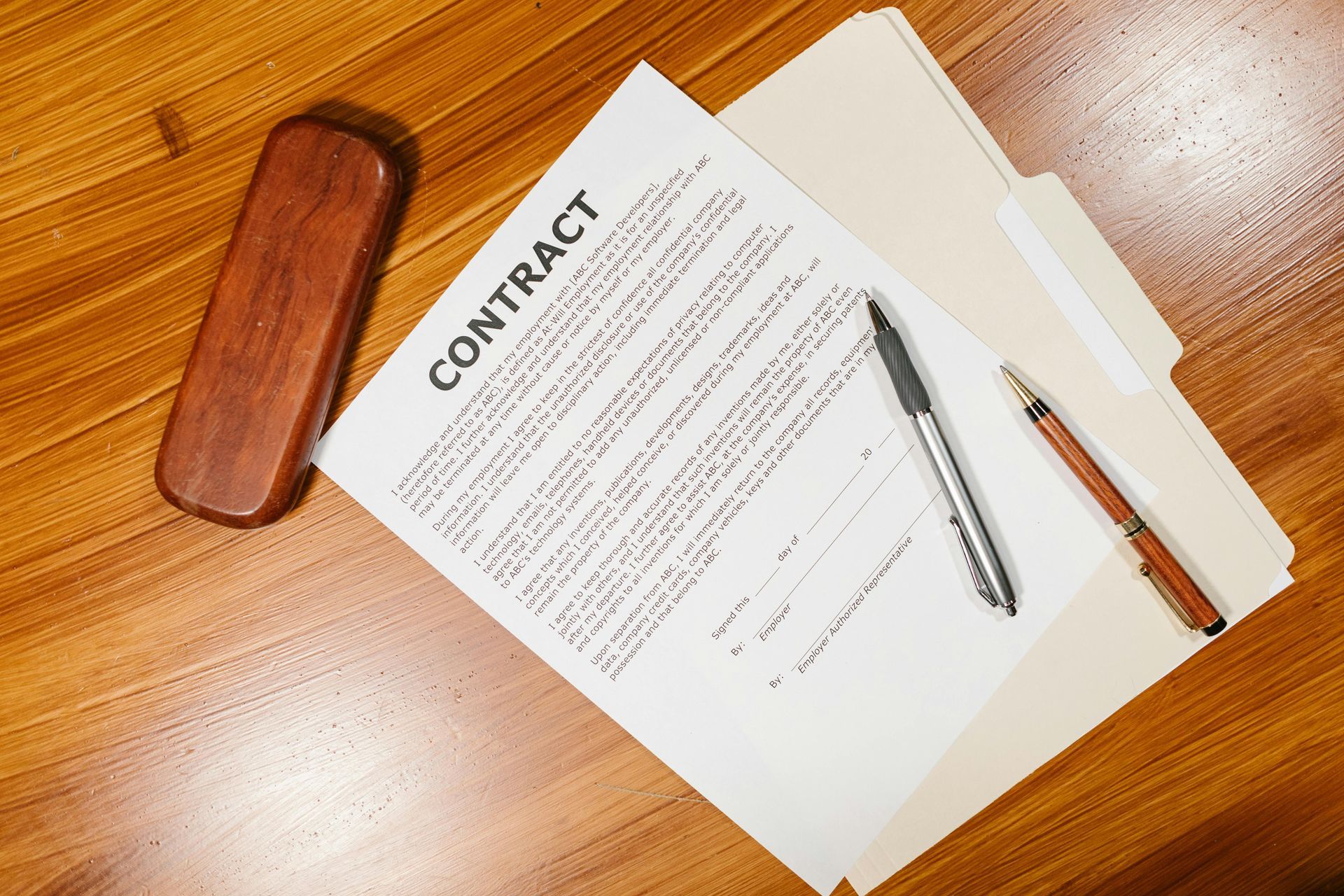Litigation Attorney Services for CEOs: Protect Your Business With Expert Legal Support
A skilled litigation attorney can be the difference between business growth and a costly setback. CEOs of professional service companies in Pennsylvania, New Jersey, and New York know that legal disputes can disrupt daily operations and threaten long-term success. Having the right legal partner is not just wise, it's necessary in today’s challenging environment.
Company Counsel is dedicated to guiding business owners with practical, business-focused legal strategies. Backed by deep experience and a commitment to meet your legal team , you’ll have support designed for entrepreneurs who need real solutions, not just lengthy legal memos. Book a discovery call or contact Company Counsel to protect your business and keep your attention where it belongs—on growth.
What Does a Litigation Attorney Do for Businesses?
 Photo by Kaboompics.com
Photo by Kaboompics.com
A litigation attorney steps in when a business's future and reputation are on the line. These legal specialists help companies manage risks, resolve conflicts, and, if needed, fight for their interests in court. Whether dealing with broken contracts, partnership disputes, or employment issues, a litigation attorney ensures that your business has a capable advocate to protect what you have built. Here’s a closer look at their role and how they support companies throughout every stage of a legal dispute.
Assessing Risk and Advising on Prevention
Before conflicts ever reach a courtroom, a litigation attorney works closely with business owners to spot risks that could lead to lawsuits. This guidance helps company leaders make smart choices, save money, and shield their brand. For example, an attorney can review contracts, business practices, and company policies to identify problem areas.
Typical risk management services include:
- Reviewing business contracts for favorable terms and pitfalls.
- Analyzing compliance with state and federal laws.
- Training employees and management on best business practices.
Proactive planning can prevent costly disruptions. For ongoing contract needs, see how Business Contract Services can solidify your agreements.
Handling Legal Disputes
When disputes arise, swift and strategic action makes all the difference. A litigation attorney investigates the issue, collects the facts, and develops a clear legal strategy. Their job is not only to defend but also to find quick, cost-effective solutions.
The typical process includes:
- Evaluating claims or defenses to determine the business's position.
- Negotiating with the other party to reach a fair deal or settlement.
- Drafting legal documents such as demand letters or formal complaints.
- Representing you in court, arbitration, or mediation if a resolution cannot be reached privately.
Attorneys are not just fighters—they are problem solvers trained to resolve disputes before they become public or expensive lawsuits. Find more about Company Counsel’s approach to Business Dispute Resolution.
Advocating in Court or Negotiations
If a lawsuit is filed, a litigation attorney steps in as the company’s voice. They handle all courtroom procedures—drafting filings, collecting evidence, and arguing the case before a judge or jury. Successful litigation often saves businesses from far bigger losses down the road.
Attorneys also seek settlements out of court, using negotiation skills to reach agreements that protect clients’ interests and limit exposure. In many situations, settling can save time, money, and reputation.
For a detailed look at what business litigation lawyers do each day, the article “ What Does a Business Litigation Lawyer Do? ” offers further insight.
Guide Through the Legal Process
Navigating the legal system can be confusing. A litigation attorney explains each step, answers tough questions, and helps business owners weigh their options. This support is critical when emotions run high or the stakes are significant. The right legal partner can help you focus on your business goals while they handle the legal heavy lifting.
If you want hands-on guidance, book a discovery call or contact Company Counsel to get support tailored for your business’s needs.
Summary Table: Litigation Attorney Roles
| Key Role | Description |
|---|---|
| Risk Prevention | Identify and reduce possible legal threats |
| Contract Review | Draft, review, and enforce agreements |
| Dispute Handling | Resolve issues before they escalate |
| Representation | Advocate in negotiations, mediation, or litigation |
| Legal Guidance | Support owners in every legal stage |
A knowledgeable litigation attorney provides more than courtroom experience. Their broad legal skills, business sense, and commitment protect your business every step of the way. To learn more about an attorney’s unique background and focus, read the Bernard A. Williams Profile.
How Litigation Attorneys Protect Your Business Interests
A knowledgeable litigation attorney stands as your business’s first and last line of defense. Whether preventing conflict or fighting for your company’s rights in court, their role covers key situations that can shape your company’s future. Here’s what a litigation attorney does to help maintain stability and keep your business prepared for both challenges and opportunities.
Preventing Disputes Before They Escalate
 Photo by Pavel Danilyuk
Photo by Pavel Danilyuk
Litigation attorneys do more than just show up in court—they often work behind the scenes to keep disagreements from exploding into public legal battles. While no company can control every outcome, an attorney’s early action can limit risks, costs, and stress.
Key ways a litigation attorney helps prevent disputes include:
- Negotiation : Attorneys approach other parties before matters reach court, striking deals that work for both sides. These deals are private and effective at maintaining business relationships.
- Mediation : When an outside voice is needed, attorneys guide you through mediation. These sessions let a neutral third party help settle issues quietly.
- Fast Response : Quick legal advice, such as sending a demand letter or reviewing a new contract, can nip problems in the bud before they harm your reputation or bottom line.
Businesses that take early action often save thousands on legal fees and avoid negative press. Discover more ways Company Counsel supports risk reduction on the page about Managing Business Risk and IP , which covers everything from compliance audits to dispute planning.
Supporting Businesses During Litigation
When a dispute can’t be resolved privately and litigation is necessary, your attorney’s focus shifts to defending your interests each step of the way. This stage involves much more than making arguments in court.
The litigation process usually involves:
- Filing Essential Documents : Your attorney prepares and submits complaints, responses, and motions that form the legal basis for your case.
- Building Your Case : They investigate, collect evidence, and prepare for hearings.
- Courtroom Representation : Skilled lawyers present your position before judges or juries, making sure your side is clearly and strongly argued.
- Settlement Negotiations : Even during litigation, attorneys seek fair settlements to save you time and money when possible.
Company Counsel’s team, including seasoned professionals like Linda Alle Murphy , brings practical litigation experience and direct advice to every step of the process. Their methods focus on keeping your business running—minimizing stress so you can focus on growth, not just the dispute.
To make the process even easier, resources like the Client Onboarding Hub provide step-by-step guidance for new and existing clients, making sure you have help from the moment an issue arises until it’s resolved. If you want this level of dedication, book a discovery call or contact Company Counsel for the support your company deserves.
Choosing the Right Litigation Attorney for Your Business
 Photo by Kaboompics.com
Photo by Kaboompics.com
Selecting a litigation attorney is one of the most important choices a CEO or business owner will make. The right partner can guide your business through challenges, keep you focused on growth, and protect your company’s reputation when legal trouble arises. Look for a litigation attorney who matches your vision, understands your sector, and is prepared to support your goals no matter the obstacles.
Let’s break down the essentials of finding a legal advisor who will stand by your side through thick and thin.
Prioritize Experience in Business Litigation
Experience is the foundation of effective legal representation. You want someone who has handled disputes like yours and knows the local court systems. Attorneys with experience in your industry can spot risks early and develop winning strategies quickly.
When evaluating a litigation attorney’s background, look for:
- Years working with businesses similar to yours.
- A track record of resolving disputes both inside and outside of court.
- Familiarity with regional regulations and judges.
These factors help ensure you have an attorney prepared for the unique disputes that business owners face every day. For another perspective on the qualities that matter most, review the Ultimate Guide to Finding a Corporate Litigation Attorney.
Assess Communication and Compatibility
Legal issues are stressful enough without poor communication. Choose an attorney who keeps you informed, answers questions clearly, and speaks in plain language. A great litigation attorney listens to your concerns and works as a partner, not just a service provider.
Signs of good communication skills include:
- Prompt and regular updates.
- Straightforward answers instead of legal jargon.
- Willingness to discuss options and respect your input.
Compatibility also matters. You should feel comfortable sharing sensitive business information, knowing your attorney will treat it with care and confidence.
Understand Fee Structures and Value
Cost matters, but what you get for your investment matters more. Litigation can be unpredictable, so ask about fee structures up front. Find out if the attorney charges hourly, offers flat fees, or provides alternative billing arrangements.
Compare what is included in each option:
- Hourly billing for ongoing representation.
- Flat-fee services for common disputes or filings.
- Retainer models for extended legal guidance.
Transparent discussions about cost help avoid surprises. Many law firms, such as Company Counsel, offer flexible plans like Fractional General Counsel services for businesses that want ongoing access to legal advice.
Look for a Problem-Solver and Strategic Thinker
Top litigation attorneys see the big picture. They aren’t just focused on winning a court case. Instead, they help clients resolve conflicts while minimizing business disruptions and public exposure. The most effective lawyers tailor their advice to support long-term goals, not just the issue at hand.
Key qualities to seek:
- Creativity in settlement negotiations or alternative dispute resolution.
- Ability to think several steps ahead in every scenario.
- Experience preparing for trial if settlement isn’t possible.
You can see how Company Counsel’s team members, such as the seasoned attorneys highlighted in the Jon Thielen Profile , offer this balance of courtroom experience and business sense.
Ask About Local Knowledge and Resources
Regional differences in laws and court systems can impact litigation results. A local attorney will understand the nuances of local procedures, court deadlines, and judge preferences. This knowledge can save valuable time and money, helping your case move smoothly.
Local attorneys also have established relationships with industry experts, mediators, and other professionals who may play a critical role in your defense.
Evaluate Their Professional Reputation
Take time to review your attorney’s reputation in the business community. Search for testimonials, case results, or even references from other CEOs. A strong record of positive outcomes builds trust and confidence.
For added insight, you can explore Company Counsel’s other attorney biographies, such as the Ricardo Unikel Biography , to get a sense of the team’s depth and focus areas.
Decision Table: Key Considerations When Hiring
To make your selection easier, use this quick comparison table as you interview candidates:
| Factor | Key Questions to Ask | Why It Matters |
|---|---|---|
| Experience | Do they handle cases like yours? | Ensures relevant skills |
| Communication | Are they responsive and clear? | Builds trust and reduces stress |
| Fee Structure | What is included, and how are fees billed? | Prevents surprises, supports planning |
| Strategic Approach | How do they resolve conflicts outside of court? | Limits cost, risk, and disruption |
| Local Knowledge | Do they know your state’s business laws? | Speeds up the process, avoids mistakes |
| Reputation | What do other business owners say about them? | Reflects quality and reliability |
Making a wise choice now will provide peace of mind when a tough situation arises. If you need guidance on if and when to file a lawsuit, check out the analysis at To Sue or Not to Sue for practical advice.
Reach out to Company Counsel to book a discovery call, ask questions, or get assistance in choosing the right litigation attorney for your company’s needs. The right legal partner will safeguard your business and advance your interests every step of the way.
Get Legal Support Before, During, and After Disputes
Every CEO and business owner will face uncertainty when disputes threaten daily operations or long-term goals. If you wait until a problem grows out of control, the costs—in money, time, and business reputation—can multiply quickly. Instead, a skilled litigation attorney guides you through every stage: planning ahead, navigating active disputes, and managing the aftereffects. This approach means you’re not left scrambling during a crisis. You're always moving forward with confidence.
Planning Ahead: Legal Support Before Disputes Arise
Smart business leaders don’t wait for trouble—they build legal safeguards that shield their company from the start. Good preparation saves money, reduces stress, and turns potential nightmares into manageable issues.
Here’s how a litigation attorney can help before disputes ever become public:
- Review key agreements: Contracts, partnership documents, and employment terms need solid language that protects your interests.
- Spot business risks: Attorneys analyze business practices to catch risky gaps and compliance issues that could lead to claims.
- Educate your team: By training managers and staff, you cut down on mistakes that spark legal trouble.
If you’re looking for ongoing advice rather than one-off help, consider the benefits of Fractional General Counsel Services. This option gives you reliable legal support on a flat fee instead of unpredictable hourly bills.
Managing Disputes as They Happen
When a problem hits—whether it’s a contract breach, a partnership split, or a regulatory investigation—fast and focused action matters. Litigation attorneys look at the facts, develop a strategy, and act to protect your business, your team, and your reputation.
During a dispute, experienced attorneys provide:
- Clear issue analysis: They review claims and defenses so you know your strengths and weaknesses.
- Prompt response: Sending demand letters or responding to lawsuits keeps you in control and signals seriousness.
- Negotiation skills: Many cases settle without trial. An attorney negotiates on your behalf, saving you time and money.
For companies wanting lower risk and more control, explore Company Counsel’s other How We Help Businesses resources that explain the dispute resolution process.
Handling the Aftermath: Post-Dispute Legal Support
Even once the dust settles, new legal questions can pop up—enforcement of judgments, repairs to business relationships, or updates to processes so you don’t see the same issue again. Litigation attorneys remain crucial partners after a dispute, helping you:
- Monitor agreement compliance: Whether you win or settle, keeping the other side honest protects your outcome.
- Repair and restore: Sometimes, it’s important to re-establish trust with clients, partners, or team members.
- Update risk strategies: Make improvements based on lessons learned so your company is better protected the next time.
Continuous legal support is one of the best ways to reduce future stress. CEOs seeking durable, affordable guidance can ask about Fractional General Counsel Services for ongoing protection and peace of mind.
When disputes threaten to disrupt your business, don’t wait to find solutions. Book a discovery call or contact Company Counsel to build a legal safety net before, during, and after any business conflict.
Conclusion
Working with an experienced litigation attorney gives CEOs and business owners more than legal defense—it creates a foundation for confident decision-making and growth. From the earliest sign of risk to final resolution, a skilled legal team helps protect your business, control costs and keep your focus on what matters most. If you want ongoing advice or help with a current dispute, book a discovery call or contact Company Counsel for personalized guidance that fits your goals.
Having business lawyers on your side lets you move forward with peace of mind, knowing that both daily operations and future opportunities are covered. Don’t wait until a challenge grows into a crisis—get support now and set your company up for lasting success.








